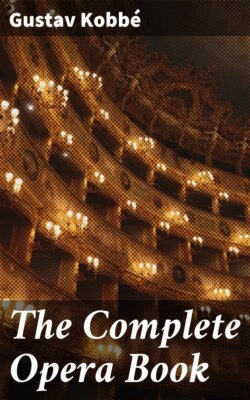Читать книгу The Complete Opera Book - Gustav Kobbé - Страница 13
На сайте Литреса книга снята с продажи.
Wolfgang Amadeus Mozart
(1756-1791)
ОглавлениеTable of Contents
THE operas of Gluck supplanted those of Lully and Rameau. Those of Mozart, while they did not supplant Gluck's, wrested from them the sceptre of supremacy. In a general way it may be said that, before Mozart's time, composers of grand opera reached back to antiquity and mythology, or to the early Christian era, for their subjects. Their works moved with a certain restricted grandeur. Their characters were remote.
Mozart's subjects were more modern, even contemporary. Moreover, he was one of the brightest stars in the musical firmament. His was a complete and easy mastery of all forms of music. "In his music breathes the warm-hearted, laughter-loving artist," writes Theodore Baker. That is a correct characterization. "The Marriage of Figaro" is still regarded as a model of what a comic grand opera, if so I may call it, should be. "Don Giovanni," despite its tragic dénouement, sparkles with humour, and Don Giovanni himself, despite the evil he does, is a jovial character. "The Magic Flute" is full of amusing incidents and, if its relationship to the rites of freemasonry has been correctly interpreted, was a contemporary subject of strong human interest, notwithstanding its story being laid in ancient Egypt. In fact it may be said that, in the evolution of opera, Mozart was the first to impart to it a strong human interest with humour playing about it like sunlight.
The libretto of "The Marriage of Figaro" was derived from a contemporary French comedy; "Don Giovanni," though its plot is taken from an old Spanish story, has in its principal character a type of libertine, whose reckless daring inspires loyalty not only in his servant, but even in at least one of his victims—a type as familiar to Mozart's contemporaries as it is to us; the probable contemporary significance of "The Magic Flute" I have already mentioned, and the point is further considered under the head of that opera.
For the most part as free from unnecessary vocal embellishments as are the operas of Gluck, Mozart, being the more gifted composer, attained an even higher degree of dramatic expression than his predecessor. May I say that he even gave to the voice a human clang it hitherto had lacked, and in this respect also advanced the art of opera? By this I mean that, full of dramatic significance as his voice parts are, they have, too, an ingratiating human quality which the music of his predecessor lacks. In plasticity of orchestration his operas also mark a great advance.
Excepting a few works by Gluck, every opera before Mozart and the operas of every composer contemporary with him, and for a considerable period after him, have disappeared from the repertoire. The next two operas to hold the stage, Beethoven's "Fidelio" (in its final form) and Rossini's "Barber of Seville" were not produced until 1814 and 1816—respectively twenty-three and twenty-five years after Mozart's death.
That Mozart was a genius by the grace of God will appear from the simple statement that his career came to an end at the age of thirty-five. Compare this with the long careers of the three other composers, whose influence upon opera was supreme—Gluck, Wagner, and Verdi. Gluck died in his seventy-third year, Wagner in his seventieth, and Verdi in his eighty-eighth. Yet the composer who laid down his pen and went to a pauper's grave at thirty-five, contributed as much as any of these to the evolution of the art of opera.
